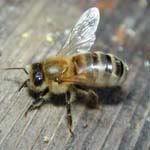One out of every three bites of food that we consume is due to the work of honeybees, serving as crucial pollinators in agriculture and farming communities. Yet agriculture and food production may be severely impacted by Colony Collapse Disorder (CCD), a trend documented in honey bee colonies and prominently featured in a New York Times story (1). Beekeepers are reporting estimates as high as 80% loss of their honey bee colonies. Such a huge loss of the services of bees is extremely serious and beekeepers report it's a growing trend.
The cause of CCD is unknown. Although factors being considered include pesticides, mites, microbial disease and habitat decline, there's a possible link that's not being investigated. Highly respected scientists believe that exposure to genetically engineered crops and their plant-produced pesticides merit serious consideration as either the cause or a contributory factor to the development and spread of CCD.(2,3,4,5,6,7,8,9,10) In searching for the cause of massive honey bee losses nationwide, we must leave no stone unturned to find the answer.
Monday, March 26, 2007
One out of every three bites of food is connected to the work of honeybees.
The Sierra Club:
Subscribe to:
Post Comments (Atom)

5 comments:
A large portion of bees (and I presume other natural pollinators) have been drastically reduced in China because of chemical agriculture. Many crops in China are now hand pollinated.
Hand pollination may soon be a growth industry in the rest of the world as well.
Dear god. Thanks for the info, I had no idea.
I leaped before I looked. The hand pollination is for apples and pears.
Still... there is a lot going on in China: The poisoning of pet food, the heavy pollution, the misuse of pesticides, lead, chemicals.
Kinda like the United States in the first half of the 1900s.
But I thought the Monsanto GM plants were actually resistant to the pesticides.... Do the plants really have the actual pesticide in their DNA?
Then what the hell are we eating?
Post a Comment